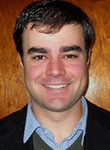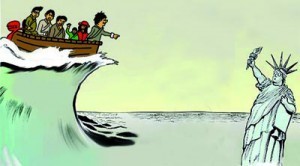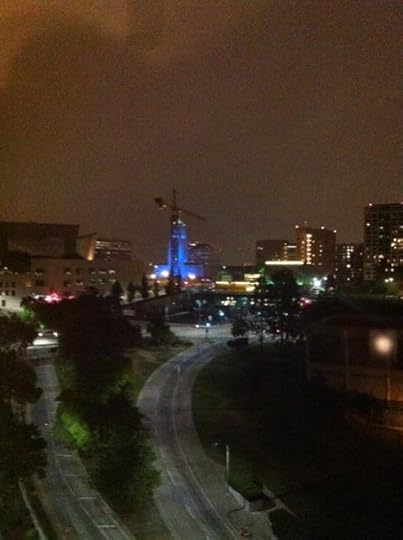Lisa Napoli's Blog, page 26
September 19, 2011
#3goodthings
@Girl Scouts' 2011 National Young Woman of Distinction helps refugees from #Bhutan
This gal is one of a number of young women who are being honored at the upcoming Girl Scouts' conference here in LA. She's inspirational. (Thanks, Mary)
Vrinda
Girl Scouts Heart of Central California
[image error]The project: R.E.S.P.E.C.T Club
Vrinda's Sacramento community had experienced an influx of refugees from Bhutan, Nepal, and India. Vrinda discovered that many of the teen refugees were attending her high school, and she felt it was her responsibility to stand up and help these teens assimilate to a new culture. She created an after-school tutoring club for the teen refugees and collected thousands of books to form "mini libraries" for their homes. Vrinda also scheduled weekend classes to help students catch up and move ahead in coursework.
[image error]








#Wikileaks releases cables on #Bhutan: American Embassy uncovers smuggling of Bhutanese citizens to the US: @Business_Bhutan
http://www.businessbhutan.bt/?p=7451
wikileaks releases cables on bhutan:american embassy uncovers smuggling of bhutanese citizens to the us
By tenzing_LAMSANG | 10 September 2011 | 17 Comments
Of the several cables released by Wikileaks on Bhutan, three cables show how large numbers of Bhutanese citizens are illegally being smuggled to the United States of America under the guise of cultural troupes and tourist visas. It says Bhutanese people are organizing human smuggling.
A 2010 cable says that a group of so called Bhutanese cultural performers was the front for human smuggling to the US. The trip was organized by Sonam Phuntsho (proprietor of Sonam Kuenphen School in Bumthang) and his son Gyembo Dorji.
The group initially told the US Embassy that their purpose of travel was to perform as members of a Buddhist folk music and dance troupe at several US venues.
After the interview, the Fraud Prevention Unit (FPU), as per the normal procedure, reviewed the information provided by the members but found several anomalies.
One issue was that the organizer of the trip, Sonam Phuntsho, was still in the USA though records showed his departure. On the US Embassy calling him in USA, they found that the information given by him about his spouse did not match the visa application details.
It was also found that none of the members of the group were aware about the venues where they would be performing. Five members of the group had no travel history while all the others had similar travel history. This was seen suspiciously as the embassy had experiences of Indian applicants make short trips to South-East Asian countries to improve their chances of getting a visa to the US.
The matter was then fully transferred to the fraud prevention unit of the embassy which individually interviewed six of the applicants.
The first interview was with the group leader, Gyembo Dorji. When questioned about the several inconsistencies in the documents and information provided, the cable says that Gyembo Dorji confessed to the fraud.
He informed the FPU team that the travel arranger, Sonam Phuntsho, was actually his father and admitted that none of the members was a performer, but their intention was to travel to the US to work or settle illegally.
Gyembo Dorji also informed FPU that his mother, Dema Phuntsho, was currently in his village in Bhutan and the lady, alleged to be Dema Phuntsho, who had already travelled with his father to the US and posed as his wife during the visa interview, was unknown to him.
While Gyembo Dorji initially stated that there was no money exchanged between the group members and his father for the visa scheme, two members (Kuenzang Lhaden and Kingley Zangmo) later confirmed that they had been told to pay Sonam Phuntsho US$ 3,000-4,000 after receiving the visa and arriving in the United States.
The other five group members interviewed by FPU admitted their participation in the scheme through prepared written and affirmed statements that they were actually intending to travel to the US to work illegally.
They said that they had been coached by Gyembo Dorji and Sonam Phuntso to maintain silence to their motives as well as the father-son family relationship. They admitted that none of the other members of the group were performers and that all were acting in concert to get to the United States.
The US Embassy denied visas for the entire group. The cable says that the true location of Sonam Phuntsho and the woman posing as his wife are uncertain at the time. Business Bhutan learnt that Sonam Phuntsho is in Bhutan. The cable said that there was a need for continuing careful scrutiny of Bhutanese group travelers.
In an earlier instance in 2008, a US Embassy cable titled "Bhutanese official turns smuggler" identified Tshering Dorji, a former BCCI secretary general and current travel agent, as a human smuggler.
The cable sent by the then US Ambassador, David Mulford, says that eight of the nine associated applicants confessed to paying up to US$10,000 to their fixer to allow them to work and/or immigrate to the US.
The cable says that the embassy brought this case to the attention of Bhutan Embassy officials in New Delhi.
Like in the above case, the US Embassy officials became suspicious when they noted striking similarities in the travel history as all of them had travelled only to India except for Tshering Dorji. Each of the applicants also had some connection to the Bhutan Chamber of Commerce and Industry, either as members or having been employed there at some time.
The cases were referred to the Fraud Prevention Unit.
During the interview, Tshering Dorji stated that he had decided to arrange travel for Bhutanese citizens who wanted to go to the United States. According to him, he charged each of his Bhutanese clients US$ 10,000 for a one-month trip to New York City, Milwaukee, Los Angeles and San Francisco.
Each of the remaining nine applicants was then interviewed separately. Eight admitted they were charged US$10,000 for a tourist visa to the US and confessed having discussed with the travel agent plans of staying in the US for one or two years. However, all of the applicants' DS156 forms noted only one-month intended stays. The visas were all refused by the embassy.
A review of Tshering Dorji's previous applications for visas revealed that he attempted to secure visas for at least eight individuals in 2005 and 2006. Of the eight, five had overstayed.
In response to concerns raised on smuggling of Bhutanese applicants, the US Embassy in New Delhi in 2009 completed a three-part study of Bhutanese non-immigrant visa (NIV) applicants.
The study reviewed: one, Bhutanese students issued visas between FY 2006 and FY 2008; two, all other NIV cases for FY 2007; and three, all other NIV cases for a portion of FY 2008.
The Embassy's study on student visas show broad compliance with the law and overstays rates of less than one half of one percent which is very good. However, validation of the other visa applicant categories reveals apparent non-compliance rates of over 16% and 9% in FY 2007 and FY 2008 respectively by staying back beyond the visa time.
The study showed that of the 174 Bhutanese students issued visas in FY 2006, FY 2007, and FY 2008, only one applicant was in a "deactivated" status whose departure from the United States could not be confirmed.
The cable says that "nonetheless, these results speak well for Bhutanese student visa recipients' appropriate use of their visas."
In 2007, there were 334 non-student visa applications. Of this, it was found that 22 had overstayed and 33 had not given the correct contact information. This, the embassy assumed was because they had intended to overstay. It was also found that 14 applied to become permanent residents while another 20 applied to prolong their visas.
In 2008, 25 recipients were confirmed to have overstayed. Calls attempted for 27 applicants revealed that the contact information provided on the form was incorrect and it was assumed that these applicants had done so with the intention of overstaying. One filed to become a permanent resident while five others wanted to extend their visas.
The cable says that the relatively large number of Bhutanese travelers who remain in the US gives cause for greater scrutiny of their visa applications. It says that the embassy will take greater care to verify contact information before issuing visas to these applicants.
When Business Bhutan contacted the Police Chief, Brigadier Kipchu Namgyal, he said, "Someone has to file a complaint on the issue for a case to be registered. We can investigate but we cannot file a case based on a website."
He also said that the issue of territorial jurisdiction was also controversial when one Bhutanese commits an offence against another in a foreign territory. He said, "If the offence is committed outside the country where our laws cannot operate, we don't have territorial jurisdiction. However, this is a controversial and legalistic issue and the Office of the Attorney General (OAG) would know better."
The attorney general, Phuntsho Wangdi, said, "We will have to examine the details of the case once it is forwarded to us by the police. We can comment only after that."








September 18, 2011
#3goodthings
earthquake strikes #Bhutan almost 2 years to the day after the last one/prayers for all there
September 17, 2011
When opting for #happiness or income, many go for the cash: #Cornell Chronicle
http://www.news.cornell.edu/stories/Sept11/HappinessMoney.html
When opting for happiness or income, many go for the cash

Rees-Jones
Given the choice, would you take a good-paying job with reasonable demands on your time or a high-paying job with longer work hours, permitting only six hours of sleep? Many people opt for the cash, even when they know their decision will compromise their happiness, according to a new Cornell study.
"You might think of happiness as the ultimate goal that people pursue, but actually, people think of goals like health, family happiness, social status and sense of purpose as sometimes competing with happiness," said Alex Rees-Jones, a Cornell doctoral student in the field of economics and co-author of a paper to be published in a forthcoming issue of the journal American Economic Review. His co-authors include Cornell assistant professors of economics Dan Benjamin and Ori Heffetz, as well as University of Michigan professor Miles Kimball.
"We found that people make trade-offs between happiness and other things," Rees-Jones said. "For example, they explicitly told us in the free response sections that they would be happier one way, but their family would be happier if they took higher-paying options." They also said they were sometimes willing to choose a job that they thought would bring less happiness for themselves if they thought it would generate a greater sense of purpose, higher social status, a greater sense of control or a higher level of their family's happiness, Rees-Jones said.
The study asked more than 2,600 survey participants (including 633 Cornell students) to consider a variety of scenarios, including the choice between an $80,000 job with reasonable work hours and seven and a half hours of sleep each night, or a $140,000 job with long work hours and time for only six hours of sleep.
Subjects were then asked which option would make them happier.
"On average, there are systematic differences between what people choose and what people think would make them happier," Rees-Jones said. "For example, people are more likely to choose the higher-income/lower-sleep job even when they don't think it will make them happier."
The authors "wanted to see if people were trying to be as happy as possible," Rees-Jones said.
After the survey, subjects were asked if they thought their responses were in error. "Only 7 percent told us that they thought they were making mistakes," Rees-Jones said. "When we asked them if they would regret any cases where they had a discrepancy between choice and well-being, 23 percent said yes. In both cases the vast majority said no, it wasn't a mistake, and no, they wouldn't regret it."
"Overall, this indicates that many are willing to pursue a course that sacrifices happiness in favor of other important goals," said Rees-Jones. "These respondents seem to indicate that maximizing happiness was not perceived to be in their own best interest. However, even if happiness is only one of many goals, it was still the strongest single predictor of choice in our data."
This research was supported by the National Institute on Aging.








#Wikileaks cables on #Bhutan and #refugee situation
There goes my Saturday; I'm immersed in these fascinating cables regarding Bhutan, many of which have to do with the refugee situation and visa issues (note the one about the group posing as a dance troupe in order to gain entrance to the US). Thanks to Marian Gallenkamp the the Bhutan Research site for making these available:
http://www.bhutan-research.org/us-diplomatic-cables-on-bhutan#








Blue City Hall from our window
September 16, 2011
Tired of sitting behind that #desk and dreaming of the bigger world beyond? #wsgt
Come to Meet Plan Go on October 18th in LA and hear me and others talk about how we got out from behind it. And if you're not in LA, there are other events planned around the nation that day. (Thanks for the invitation, Lisa!)
Details:
http://meetplango.com/national-event/2011-los-angeles-event/





















































